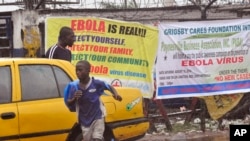A group of young men armed with clubs, claiming that "there's no Ebola" in Liberia, raided a quarantine center for the deadly disease in Monrovia overnight, prompting about 20 patients infected with the deadly virus to flee, a witness said Sunday.
Liberian officials fear Ebola could soon spread through the capital's largest slum after the looters chased off Ebola patients and took items including blood-stained sheets and mattresses.
"They broke down the door and looted the place. The patients have all gone," said Rebecca Wesseh, who witnessed the attack and whose report was confirmed by residents and the head of Health Workers Association of Liberia, George Williams.
Williams, said the unit housed 29 patients who "had all tested positive for Ebola" and were receiving preliminary treatment before being taken to hospital.
"Of the 29 patients, 17 fled last night (after the assault). Nine died four days ago and three others were yesterday taken by force by their relatives" from the center, he said.
The violence in the West Point slum occurred late Saturday and was led by residents angry that patients were brought from other parts of the capital to the holding center, Tolbert Nyenswah, assistant health minister, said Sunday.
The group also looted equipment and food from the facility, witnesses said.
Liberian police restored order to the West Point neighborhood, which is home to an estimated 60,000 to 100,000 poor Liberians.
Ebola has killed 1,145 people in West Africa, according to the World Health Organization, which added that Liberia has recorded more Ebola deaths - 413 - than any of the other affected countries - Sierra Leone, Nigeria and Guinea.
'Plague villages'
To try to control the Ebola epidemic spreading through West Africa, Liberia has quarantined remote villages at the epicenter of the virus, evoking the "plague villages" of medieval Europe that were shut off from the outside world.
With few food and medical supplies getting in, many abandoned villagers face a stark choice: stay where they are and risk death or skip quarantine, spreading the infection further in a country ill-equipped to cope.
In Boya, in northern Liberia's Lofa County, Joseph Gbembo, who caught Ebola and survived, said he is struggling to raise 10 children under five years of age and support five widows after nine members of his family died from the virus.
He said he has received no food or health care for the children and no help from government officials.
Aid workers said that if support does not arrive soon, locals in villages like Boya, where the undergrowth is already spreading among the houses, will simply disappear down jungle footpaths.
"If sufficient medication, food and water are not in place, the community will force their way out to fetch food and this could lead to further spread of the virus," said Tarnue Karbbar, a worker for charity Plan International based in Lofa County.
In the week ending August 13, Lofa county recorded more new cases of Ebola than anywhere else - 124 new cases of Ebola and 60 deaths.
WHO and Liberian officials have warned that, with little access by health care workers to the remote areas hidden deep in rugged jungle zones, the actual toll may be far higher.
Liberia containment strategy
In Monrovia, which still bears the scars of the brutal 14-year civil war that ended in 2003, officials said controlling the situation in Lofa is crucial to overcoming the country's biggest crisis since the conflict.
With her country under threat, Liberian President Ellen Johnson Sirleaf has imposed emergency measures including the community quarantine and a "cordon sanitaire" - a system of medical roadblocks to prevent the infection reaching cities, widely used against the Black Death in Medieval times.
Troops have been deployed under operation "White Shield" to stop people from abandoning homes and infecting others in a country where the majority of cases remain at large, either because clinics are full or because they are scared of hospitals regarded as "death traps."
Liberia, one of the world's least developed nations, has poor Internet and telecommunications, and only about 50 doctors for a population of more than 4 million.
In Liberia, families continue to hide their sick at home. Health workers and facilities have come under attack.
Traditional funerals, where family members bathe and dress highly contagious corpses, have expedited Ebola's spread to nine of the country's 15 counties.
Neighbors Guinea and Sierra Leone have placed checkpoints in Gueckedou and Kenema, creating a cross-border quarantine zone of roughly 20,000 square kilometers, called the "unified sector."
Within this massive ring are areas where up to 70 percent of people are infected.
"Access to these hot spots is now cut off except for medical workers," Liberia Information Minister Lewis Brown said in an interview this week.
On Saturday, Sirleaf spent the day with education teams in communities around Monrovia, trying to answer people's questions about Ebola and urge them to comply with containment measures. Hundreds of people turned out to listen and to ask questions.
Anne Look contributed to this report from Dakar. Prince Collins contributed to this report from Monrovia. Some information for this report provided by Reuters, AFP and AP.




